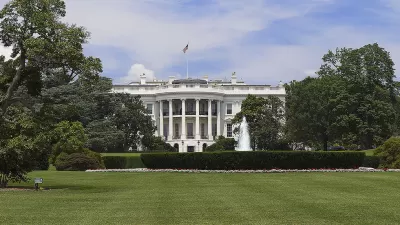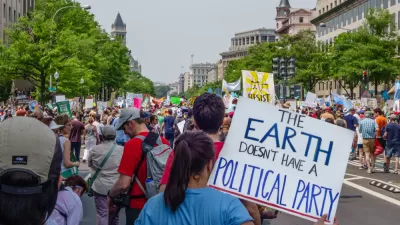This opinion piece makes the case that the American Farm Bureau's political influence has set back the agricultural industry by ignoring climate change and opposing environmental regulation.
Georgina Gustin, Neela Banerjee, and John H. Cushman Jr. write an opinion piece arguing that the Farm Bureau is failing its farmers by lobbying for the Trump administration and GOP platform on environmental regulation related to climate change.
The Farm Bureau is among the most potent political forces in Washington, skillfully parlaying the American farmer into an enduring influence machine. Its agenda [pdf] encompasses taxes and trade, health insurance and school lunches. The group's lobbying also touches many environmental issues: water pollution, fracking, biofuels and biodiversity. Conservative to the core, it mirrors the Trump administration's ideology almost perfectly.
The Farm Bureau's support of the Trump administration's position on international acclimate agreements and federal environmental regulation is of particular significance, according to the article.
It calls itself the "voice" of American agriculture, but the Farm Bureau has left its own members ill-prepared to cope with intensifying droughts, rain, heat and storms that threaten their livelihoods. The group's agenda has blocked farmers' opportunity to benefit from the agricultural transformation the climate crisis demands.
After establishing that premise, the article becomes a platform for amplifying InsideClimate News's recent series of features on the farm lobby's impact on climate policy in the United States and around the world.
FULL STORY: How the Farm Bureau’s Climate Agenda Is Failing Its Farmers

Alabama: Trump Terminates Settlements for Black Communities Harmed By Raw Sewage
Trump deemed the landmark civil rights agreement “illegal DEI and environmental justice policy.”

Planetizen Federal Action Tracker
A weekly monitor of how Trump’s orders and actions are impacting planners and planning in America.

Why Should We Subsidize Public Transportation?
Many public transit agencies face financial stress due to rising costs, declining fare revenue, and declining subsidies. Transit advocates must provide a strong business case for increasing public transit funding.

Understanding Road Diets
An explainer from Momentum highlights the advantages of reducing vehicle lanes in favor of more bike, transit, and pedestrian infrastructure.

New California Law Regulates Warehouse Pollution
A new law tightens building and emissions regulations for large distribution warehouses to mitigate air pollution and traffic in surrounding communities.

Phoenix Announces Opening Date for Light Rail Extension
The South Central extension will connect South Phoenix to downtown and other major hubs starting on June 7.
Urban Design for Planners 1: Software Tools
This six-course series explores essential urban design concepts using open source software and equips planners with the tools they need to participate fully in the urban design process.
Planning for Universal Design
Learn the tools for implementing Universal Design in planning regulations.
Caltrans
Smith Gee Studio
Institute for Housing and Urban Development Studies (IHS)
City of Grandview
Harvard GSD Executive Education
Toledo-Lucas County Plan Commissions
Salt Lake City
NYU Wagner Graduate School of Public Service





























